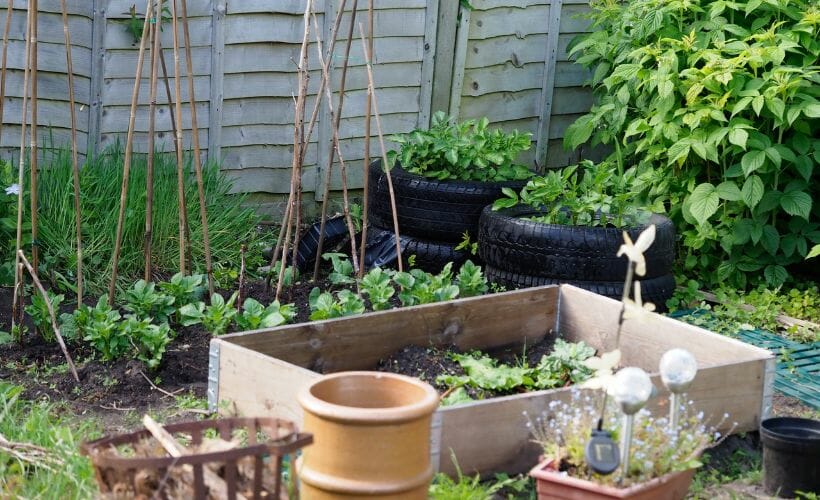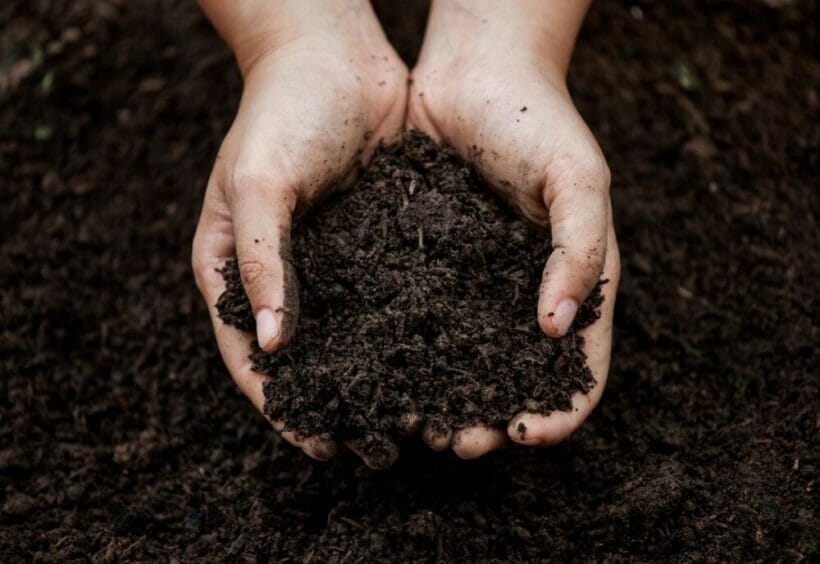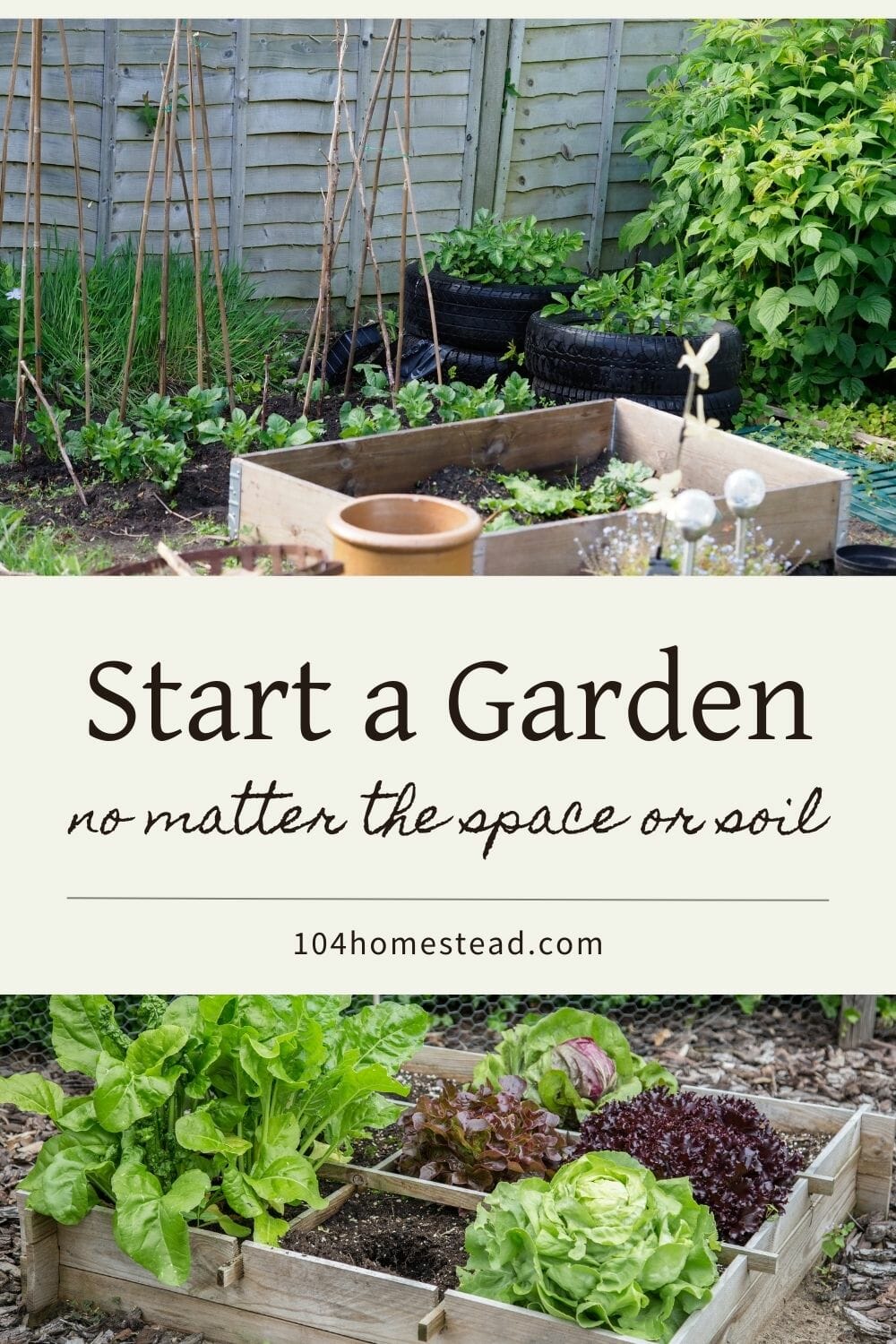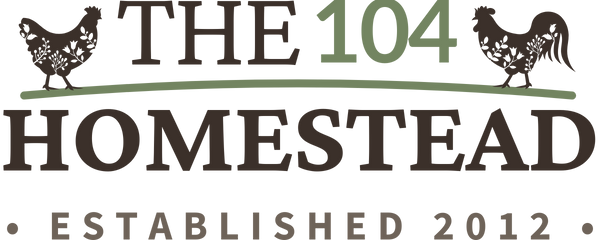How to Start a Garden in Your Yard, No Matter the Space or Soil
Want to start gardening but don’t know where to begin? Let me help you start your vegetable garden so you can start growing today.

Have you ever looked at your backyard or balcony and wished it could transform into a lush and thriving garden? Well, you’re in luck. Starting a garden, no matter how limited your space or challenging your soil may be, is easier than you think.
In fact, it’s a rewarding journey that allows you to grow your own fresh vegetables and enjoy the beauty of nature right outside your door. So, whether you have a sprawling backyard or just a small balcony, I’m here to guide you through the process of starting a garden that will flourish no matter the constraints.
Learn how to assess your space and soil, choose the right gardening style and plants, prepare your garden bed, and care for your plants throughout the growing season. Plus, we’ll delve into the secrets of making the most out of limited spaces. By the end, you’ll be equipped with all the knowledge and tools you need to create a beautiful and bountiful garden, regardless of your circumstances.
So, let’s dig in and get started on this green-thumb adventure together!
Assess Your Space and Soil
Before you start planting, assessing the unique characteristics of your space and soil is crucial. There are probably solutions to any issues your property might have. By understanding the limitations and opportunities of your specific gardening environment, you can make informed decisions that will set your garden up for success.
Sun Exposure
Begin by evaluating the amount of sunlight your space receives throughout the day. Observe the patterns and intensity of the sunlight to determine which areas are sunnier and which are shadier.
Many vegetables need at least six or eight hours of direct sun (but not all — some plants grow just fine in shade). It directly affects the harvest and health. If a plant doesn’t get enough sun, it won’t bear much and will be more susceptible to insects and diseases. Still, leafy vegetables like lettuce, spinach, and many herbs thrive in shaded gardens.
Soil Structure
Next, take a closer look at your soil. Is it sandy or clay-based? Does it drain well or retain moisture for extended periods? Understanding the composition of your soil will help you choose plants that are well-suited to its characteristics. A soil testing kit can make this process easier.
How to repair clay soil
Repairing clay soil in a vegetable garden can be done through various methods. One effective approach is building raised garden beds. By constructing raised beds, you can add a mixture of compost, sand, and organic matter to the soil, improving its drainage and overall structure.
Another option is to amend the soil with organic matter, such as compost or aged manure, to increase its fertility and enhance drainage. Regularly adding organic matter and practicing proper watering techniques can gradually improve the quality of the soil, making it more suitable for growing vegetables.
How to repair sandy soil
To repair sandy soil in a vegetable garden, additional organic matter can help retain moisture. Sandy soil tends to drain quickly and can be low in nutrients. Adding organic matter, such as compost, aged manure, or peat moss, can improve the soil’s water-holding capacity and increase its fertility. Incorporating these amendments into the soil will help it retain moisture and nutrients, providing a better environment for vegetable plants to thrive. Regularly adding organic matter and practicing proper watering techniques will gradually improve the quality of the soil and make it more conducive to vegetable gardening.
Availability of Space
In addition to sunlight and soil composition, consider the overall space available for your garden. Measure the dimensions of your backyard, balcony, or any other area where you plan to grow plants. This will allow you to determine how much space you have for containers, raised beds, or even vertical gardening options. You don’t need a giant garden to grow your own food. Even a small space can be maximized with creative solutions like hanging planters or trellises. You can also always expand a little every year so you don’t get overwhelmed.
Know Your Zone
A gardening zone, also known as a hardiness zone or climate zone, is a geographical area categorized based on its average annual minimum temperature. It helps gardeners determine which plants are well-suited for their specific region, as different plants have different temperature requirements. The United States is divided into 13 hardiness zones, ranging from Zone 1 (coldest) to Zone 13 (warmest). Knowing your gardening zone can guide you in selecting plants that are most likely to thrive in your particular climate and growing conditions. It will also tell you your first and last frost dates so you will know when to start your crops.
Challenges and Opportunities
Finally, assess any potential challenges or opportunities specific to your environment. Is your potential garden near a water source? Vegetables like water, and you’ll do yourself a favor if you place the garden close to a water source because you’ll be watering it a lot. Is your space prone to strong winds or heavy rainfall? Is it near any structures or trees that could provide shade or protection? By understanding these elements, you can plan accordingly and choose resilient plants in the face of adversity or take advantage of favorable conditions.

Choose the Right Gardening Style for You
Once you understand your space and soil, it’s time to explore various gardening styles that can be customized to suit your needs and preferences. This will help you determine the right approach for your garden and set the stage for selecting the perfect plants to bring it to life.
Gardening styles come in many options, from traditional raised beds to vertical gardens, container gardening, and even the Back to Eden method. Each style brings its own set of benefits and considerations, offering opportunities for gardeners with limited space, challenging soil, or specific climatic conditions.
Container Gardening and Vertical Gardening
Container gardening or vertical gardens can be excellent choices for those with limited space. Container gardening involves growing plants in pots or containers, which can be placed on patios, balconies, or even window sills. Container gardening allows you to move your plants around to find the best light and temperature conditions.
On the other hand, vertical gardens are perfect for utilizing vertical wall spaces or creating living walls. They allow you to grow plants vertically, saving horizontal space while still providing ample planting area.
Raised Beds & Square-Foot Gardening
If you have challenging soil conditions, raised beds can be a game-changer. Raised beds are essentially garden boxes filled with high-quality soil that you create above the ground. This method gives you more control over the soil composition and drainage, making growing a wide range of plants easier. Additionally, raised beds can provide better accessibility, alleviating the strain on your back and knees.
Square-foot gardening is a popular gardening method that involves dividing your garden bed into square-foot sections. Each square foot is then planted with specific crops based on recommended spacing. This technique maximizes the use of space and increases yield. It emphasizes efficient use of resources and minimizes waste. Square foot gardening is particularly suitable for raised bed gardens and allows for organized and manageable gardening.
Back to Eden Gardens
The Back to Eden gardening method offers several benefits for gardeners. One of the key advantages is the reduction in water usage. By applying a thick layer of wood chips as a mulch, the soil retains moisture more effectively, allowing for less frequent watering. This can be particularly valuable in areas with limited water resources or during drought conditions.
Another benefit is the improvement of soil health and fertility. The wood chips gradually break down over time, adding organic matter to the soil. This enhances its structure, nutrient content, and overall fertility, creating a thriving environment for plant growth. Additionally, the mulch helps suppress weed growth, reducing the need for extensive weeding.
By exploring different gardening styles, you can find the one that suits your needs and preferences, allowing you to create a garden that reflects your unique vision. Once you have chosen your gardening style, it’s time to move on to the next step: preparing your garden bed.
Prepare Your Garden Bed
Once you have chosen your gardening style, it’s time to move on to the next step: preparing your garden bed. Proper preparation of your garden bed is essential for creating a thriving and productive garden, regardless of its size or soil condition. Preparing your garden bed creates the optimal environment for your plants to grow and flourish.
Clear Your Space
To start, rake clear any existing vegetation or debris from the area where you plan to create your garden bed. This can include removing weeds, rocks, or any other obstacles that may hinder the growth of your plants. By clearing the space, you are providing a clean canvas for your garden to take shape.
If you have grass that needs to be removed, mow the grass as short as possible. Then, wet the area thoroughly to make the soil damp. Next, lay down several layers of overlapping newspaper or cardboard, ensuring that the entire grassy area is covered. Wet the newspaper or cardboard as you go to keep it in place. Finally, add a layer of compost or mulch on top to hold it down and prevent it from blowing away. Leave this barrier in place for several weeks to several months to smother the grass and break it down. Over time, the grass will decompose, and you can remove the newspaper or cardboard and plant directly into the prepared area. This method is a natural and effective way to remove grass without the use of chemicals.
Test Your Soil
Next, consider the soil quality in your chosen area. Testing the soil can provide valuable insight into its nutrient content and pH level. You can utilize a home soil testing kit or consult with a local gardening center to determine if any amendments or adjustments are needed. Adding organic matter, such as compost, leaf mold, or aged manure, can improve soil structure and provide essential plant nutrients.
With a clean and nutrient-rich environment, your plants will have the best opportunity to thrive and produce a bountiful harvest. So, now that your garden bed is ready, it’s time to dive into the next exciting step: planting and caring for your garden, where you’ll bring your gardening vision to life.
Planting and Caring for Your Garden
When it comes to planting, choosing the right plants for your garden’s space and the growing conditions you have is essential. Consider factors such as sunlight, temperature, and soil moisture when selecting your plants. Start by mapping out where each plant will go, ensuring they have enough room to spread their roots and grow. This methodical approach will help you maximize the use of your garden space.
As you begin planting, remember to follow the instructions on the seed packets or plant tags to ensure you’re giving each plant its best chance to flourish. Some plants may require specific spacing or additional care, so it’s crucial to be mindful of their individual needs.
Regular Watering
Regular watering is essential for the health and growth of your garden. Establishing a consistent watering schedule is important, especially during dry spells or hot summer months when plants are more susceptible to dehydration.
Aim to water deeply, ensuring that the water reaches the roots of the plants. This encourages the plants to develop deeper root systems, leading to stronger and more resilient plants overall. It is recommended to water in the morning or late afternoon when the temperatures are cooler, as this allows the plants to absorb the water before it evaporates.
Take note of the specific water requirements of different plants in your garden, as some may prefer more frequent watering while others may need less. Monitoring the moisture levels and adjusting your watering schedule accordingly will help ensure that your plants receive the hydration they need to thrive.
Regular Weeding
Regular weeding is another important aspect of caring for your garden. Weeds can quickly take over and compete with your plants for nutrients, sunlight, and water, hindering their growth and overall health. Removing weeds promptly allows your desirable plants to thrive without unnecessary competition.
Take the time to inspect your garden regularly and pull out any weeds you spot, removing them from the root to prevent regrowth. You can use hand-pulling, cultivating tools (I prefer the Garden Weasel for weeding), or even mulch to suppress weed growth.
Maintaining a weed-free garden improves its aesthetic appeal and reduces the risk of pests and diseases, as weeds can often harbor them. Dedicating a few minutes daily or weekly to weeding will help your vegetable garden flourish and thrive.
Watch for Pests and Diseases
Alongside regular watering and weeding, you must watch for any signs of pests or diseases in your garden. Monitoring your plants regularly for any unusual spots, wilting, or chewing damage can help you detect pests or diseases early on and take prompt action to protect your plants.
Common garden pests include aphids, snails, slugs, and caterpillars, while diseases like powdery mildew or blossom end rot can also affect your plants’ health. Familiarize yourself with the signs and symptoms of common pests and diseases for the specific vegetables you are growing. This way, you can identify any issues quickly and implement appropriate control measures, such as using organic pest repellents or disease-resistant plant varieties.
Keep Amending Your Soil
As you continue to care for your garden, consider incorporating organic fertilizers or compost to provide additional nutrients to your plants. These natural additives can help boost growth and improve the overall health of your garden.
If you’ve found value in this blog post and enjoyed reading it, why not share it with your Pinterest community? Pin the image below and spread the love!

With your garden bed prepared, plants carefully selected and planted, and diligent care and maintenance practiced, you’re well on your way to reaping the rewards of a successful garden. In the next section, we’ll explore how to make the most of small spaces to enjoy gardening, even if you have limited room to work with.
Starting a garden, regardless of your space or soil, is well within your reach. So, why wait? Today is perfect for heading to your local garden center and gardening.
What gardening challenges have you faced in your own space, and how have you overcome them? We’d love to hear about your experiences and any tips you have for starting a garden in limited spaces or challenging soil. Share your thoughts and insights in the comments below!

